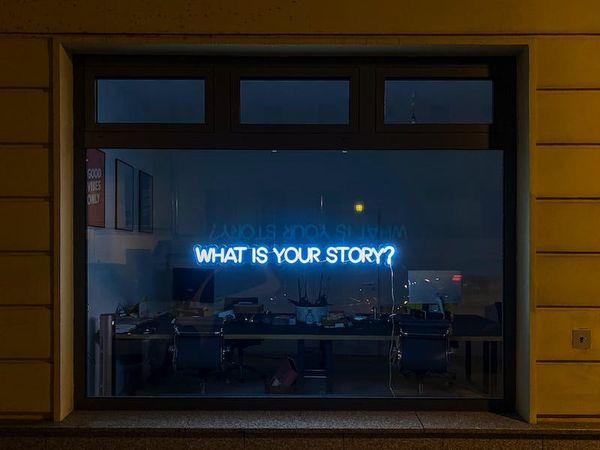7 questions to find work you love

The first step here is to focus on reflecting on the past, and not try to predict the future.
I know personally when I think about choosing what to work on, my brain immediately jumps to imagining what it would be like to do certain work. When we do this, we very easily fall into the whole “grass is greener on the other side” fallacy. We don’t know what we don’t know about those paths. We can imagine the cool parts of the work, but have no idea what those downsides are.
As we do this, we start to build these visions of this perfect job, where we enjoy every day because of the external situation we’re in. We think that our current job sucks and in order to be happy we need to change to this other situation - we need to get to the job we’re passionate about. Again, the external versus internal control of enjoyment.
Unfortunately, the reality is much different than this fantasy that we build in our heads. If we expect our passion to be effortless, we’re going to be disappointed.
Not to go too Buddhist, but we have to let go of these expectations, we have to destroy these fantasies in our head. It turns into a lose-lose situation, where if we stay in our current state, we so desperately want the path that’s on the other side. But if we make the switch to it, and learn that it’s not what we expect, it’s going to be immensely disappointing.
We’re just going to end up disappointed, no matter what.
Not to mention, if you get rid of these expectations, but end up switching due to some of the factors we talk about in a little bit, then there’s only upside to gain.
And in addition to all of that, when we try to predict the future, we’re limited by our current understanding of the world. We have a limited set of future possibilities created by our minds, based on institutional careers that are already out there.
We’re all unique individuals, and when we try to jam the unique shape of who we are into a round or square hole, it’s a recipe for work that we despise.
Instead, we need to start from 0 and start to build up from there. How else will you be able to create a truly unique career that you love?
So instead of trying to predict the future, what can we do? Luckily, we have a wealth of possibly untapped information sitting at our finger tips. We have a treasure trove of past experiences that we can reflect on and get a better understanding about ourselves and how we respond to different situations or types of work.
I’ve gathered a compilation of 7 different questions to reflect on that will help you uncover some of that important info.
7 Questions to your dream work
Number 1: What can you learn from your play?
We talked about this a little bit earlier, but there’s a lot you can learn from the sort of play you enjoy. What sort of video games do you play, or past times you enjoy, and what can you glean from your personality about HOW you do those things. What makes you really enjoy learning a certain hobby, or playing a certain game?
Number 2: Are you looking for pleasure from your work? What are your expectations for your work?
This is very similar to what we were just talking about before the list, with reference to “grass is always greener”, but really reflect on what you’re looking for. Are you expecting your job to be just like playing video games or practicing your favorite hobby? Are you expecting those dopamine hits from your job? If so, your expectations are going to destroy you. You’ll just keep believing that it’ll be an external problem. With what we were talking about with passion, suffering, and shit sandwiches in mind, reflect on what your expectations of your career are.
Number 3: What are your values?
If you honestly have no idea about your values, then your not alone. It’s a huge topic that could be a whole book in itself. But, if you’ve done any previous thought into crafting or analyzing your own values, this would be a great time to pull those out, or do a little reflecting on it to bring them to the party too.
Number 4: What’s your unfair advantage?
I haven’t read this book, but I’ve heard good praises for “The Unfair Advantage.” For this one, it comes down to analyzing what you’re naturally good at. This reflection is a little more general, like the last one, but if you’ve put any thought into your natural tendencies, and where your talents lie, definitely write that down and add it to your list.
Numbers 5 & 6: What type of work does your brain enjoy?
For this one, there are two different aspects for you to reflect on.
5. Subject
For this one, think back to a time where work has felt easy. When have you been excited to work? When has that work felt fulfilling? What have you been interested in the past? Do you normally enjoy working with your hands or more with your mind?
This reflection is more about the subject of the work, what it is you’ve physically been working on. For instance, for me it would be something like working in Google sheets, working with computers, problem solving new issues that come up, building websites, thinking about marketing strategy.
6. Style
Outside of the actual subject of the work, this is more about the style of work, or the medium. For instance, building websites may be something that the both of us like, but you may enjoy working on the new problems that arise with each site, whereas I may like the more structured parts that are the same for every site.
Do you enjoy problem solving or tinkering? Do you enjoy using your creativity? Do you enjoy building something from scratch or improving on something that is already there? Do you enjoy things that are orderly and non-deviating, or dynamic and more chaotic, always changing?
Number 7: What type of work does your body enjoy?
Where the last point was more about scratching the itches in your brain for the type and style of work, this point to reflect on is a little more physical.
The first part of this is the time spent working. Would you like to have a routine, or let it change every day? What sort of hours of work would you like, how much time off do you want? What sort of actual workflow have you enjoyed?
Another great question to ask here is “What work has left you more energized than when you started?”
The second aspect of this is the environment. This includes things like what sort of social nature have you most enjoyed in the past, was it when you were collaborating with a team, or when you were working solo? How about who you have to report to: a full time job with one boss that you build a relationship with, a few freelance clients who you have to manage, or a ton of customers who you only really talk to when there’s some sort of issue or question?
This can also extend to physical working location, having a place you need to commute to versus working from home, or traveling around the country or world for work. What sort of social and physical environments have you enjoyed in the past?
Interrogation time
The point of all of these reflections isn’t to get an exact idea into what it is that you want to do with your life, but to rather get a baseline understanding of yourself so far. Your job here is to mine your past experiences for information. Pretend like it’s an interrogation, and you’re trying to squeeze as much information out of yourself as possible. Ramble, write it down, just get it out of your head and into the physical world so you can start to dissect your personality and your past experiences.
Now from here, the next step from here is:
Taking action
Hopefully from the reflections you made in the last step, you’ll have some sort of general direction you think you want to go in. And now it’s time to test that assumption.
Taking action is simple, but it’s not easy. It’ll be hard, filled with self doubt, and you’ll constantly feel like an imposter, if you’re doing it right.
I kind of like to think of Schrödinger’s cat here. If you’re unfamiliar with this cat:
Schrödinger’s cat is a thought experiment, that illustrates the concept of the superposition of states in quantum mechanics. The experiment involves a cat that is placed in a sealed box with a vial of poison, which has a 50% chance of being released and killing the cat. According to the theory, until the box is opened and the cat’s fate is observed, the cat is both alive and dead at the same time. This paradox illustrates the seemingly impossible concept of quantum superposition, where particles can exist in multiple states at the same time.
I like to think of each one of our potential careers as one of these boxes. Every possible career path is both the right and wrong decision, until you open the box (try it out and take action) to see.
The more you plan or journal about which one you want, it wont bring you any closer towards choosing the right one. All you can see is all you can see, the outside of the box and the fantasies your mind creates.
Unfortunately there isn’t some magical box that has your ideal career waiting inside, but that step of choosing one of them and just getting started will provide you with information you wouldn’t have gotten otherwise. You need to just start.
Quantum mechanics aside, taking action is difficult. I have a couple of blog posts on the two systems of motivation, to give some insight behind the neuroscience of motivation, which you can check out here:
But for today, lets talk about one of the main inhibitors of taking action, then chat a little bit about the framework for taking action from Cal’s book.
Controlling your impulses
Oftentimes we have a good plan of the things that we need to do, but our brains just don’t want to do it. Procrastination strikes, we complain that it’s too hard, so we just default to doing the easy stuff, and end up not making any meaningful progress.
You can imagine yourself as split into two parts in your mind. There’s the part of you that’s able to look to the future, to decide on what you want to achieve, and create a plan for it. Then, there’s the more primal side that’s more indulgent in impulses, desires, cravings, those natural urges that our brains are hardwired for.
It’s not about rejecting this more ‘emotional’ side of the brain, but rather accepting it, and working towards aligning the two. And this requires training. Practice.
It starts with ignoring the desires of your impulsive brain.
You start small, with small bits of meditation. Your brain will desire stimulation, will want to grab your phone to look something up or to scroll. But instead, you take this 10 minutes to actively reign in those desires.
Dr. Huberman also talks about this, when it comes to training your “no-go” circuitry, actively denying your brain of its desires and impulses, however small.
So why are we doing this?
Detachment
As you start to deny these desires, you’ll start to cultivate detachment from your impulses. It’s a bit counterintuitive, but as you start to separate yourself from your desires, any job you have will become more enjoyable. (This all links back to what we were talking about earlier with taking responsibility for your enjoyment of work! It’s all connected!)
This detachment doesn’t totally remove your emotions and leave you apathetic, but rather helps you improve performance by letting you do your work without self limitation. Those pesky thoughts about not being good enough, of being an imposter, of self-doubt, they have nothing to grab onto with detachment. All we have is the work in front of us.
And it’s this presence with our work that helps cultivate flow and high performance.
How do we cultivate this presence? Practice. Again, with meditation and mindfulness.
Working to build more positive thoughts will also help here.
Thinking the thoughts you want to think
Neurons that fire together wire together, forming channels of least resistance in our brains. The actions that we perform, or the thoughts that we have are easier to have over and over again, for efficiencies’ sake. (This is what muscle memory is.)
The thoughts that we have over and over aren’t necessarily accurate representations of the truth, or reality. Negative thoughts about ourselves build a rut where we just think the same thing over and over.
In order to have more of a positive, present mindset, we need to start cultivating thoughts of the present and of gratitude.
Cal’s method for action
Okay, with all the woo woo stuff out of the way, let’s quickly touch on the core framework that So Good They Can’t Ignore You follows, and how you can apply that to this action taking step.
The process starts out with building rare and valuable skills. Hopefully during the reflection you were able to get some insights into your unfair advantages, or the type of difficult things you enjoy doing, and that you’ll already be pretty well positioned for this one.
The way that we build these rare and valuable skills is through deliberate practice, setting aside dedicated time to work on that which is important for growing. For this, stretching is the goal. That feeling that your pushing the boundary of your ability. You may feel like an imposter, or that you’re not sure if you’re cut out for it. But doing the work in spite of that is exactly what we’re aiming for.
It all comes down to enjoying the journey of that hard work. You need to know a direction, sure, but it’s not the finish line, but rather an endless climb. And when you feel that stretch and say “yes, that’s what I’m looking for, I feel it” and you fall in love with that feeling, then you’ll be unstoppable.
When you do this deliberate practice and continue building these skills, that gives you what Cal calls career capital, which is pretty much a resource that you can use to leverage traits you want in your career, letting you get control over your work.
He also says from here, you’d want to get to the cutting edge of your field, and use that expertise to create a mission & meaning in your work to make some sort of grander impact.
Overall, pretty decent framework, I’d say.
From there, it’s all about the process of testing and taking action, reflecting on how you feel about it, and iterating, trying something new to improve it.
Fin
I’d really love to hear your thoughts about this, if any parts really resonated with you, or if there’s anything you disagree with.
Trying to find work we love is one of the topics that really interests me, so no doubt I’ll be publishing more on this in the future. If you’d like to know when that happens, then you can sign up for my newsletter here where I share my weekly thoughts on how we can work less and live more.



